Give me a Drink! The Third Sunday of Lent

You know we are “picking up steam” in the season of Lent when the Lectionary starts turning to the long readings from the Gospel of John (John 4, 9, 11). The Church turns to these texts from John at this point in the liturgical calendar, because John is, in so many ways, a mystagogical document, a gospel intended to takes us deeper into the mysteries, that is, the sacraments.
If one is not initiated into the sacraments, John remains—in many respects—a closed book. I can attest to this from personal experience. Although I have always loved my name-sake Gospel more than any other part of Scripture, I virtually never preached from it in while I was a Protestant pastor. I was enthralled with the words and fascinated with the realities behind them, but wasn’t sure what the application was for texts like John 4 or John 6. The problem lay in the fact that, as a Christian outside the visible Church, I was only partially initiated into the sacraments. Not having experienced the sacraments, I could not recognize when Jesus was speaking of them.
Again, the Church turns to John in these days of Lent, because the Church is preparing catechumens for initiation into the sacraments, and the texts chosen are a kind of sacramental catechesis, especially concerning Baptism, the solemn celebration of which forms such a central part of the Easter Liturgy.
The Baptismal catechesis starts this weekend with the readings culminating in John 4.
The First Reading, Exod 17:3-7, recounts the famous incident in which the people of Israel almost stone Moses in their demand for water in the desert. God commands Moses to strike a certain rock near Horeb (a.k.a. Sinai) to supply water for their thirst:
Reading 1 Exod 17:3-7
In those days, in their thirst for water,
the people grumbled against Moses,
saying, “Why did you ever make us leave Egypt?
Was it just to have us die here of thirst
with our children and our livestock?”
So Moses cried out to the LORD,
“What shall I do with this people?
a little more and they will stone me!”
The LORD answered Moses,
“Go over there in front of the people,
along with some of the elders of Israel,
holding in your hand, as you go,
the staff with which you struck the river.
I will be standing there in front of you on the rock in Horeb.
Strike the rock, and the water will flow from it
for the people to drink.”
This Moses did, in the presence of the elders of Israel.
The place was called Massah and Meribah,
because the Israelites quarreled there
and tested the LORD, saying,
“Is the LORD in our midst or not?”
Of course, “Man does not live by bread alone,” in other words, our physical needs are not the definition of our truest nature. Extending the metaphor to thirst, we may also say, “Man does not live by water alone.” The satisfaction of thirst is not the ultimate answer for the human condition. The physical thirst of the Israelites in the desert is a sign point to a greater thirst, our thirst for God himself. David puts it this way: “As a hart longs for flowing streams, so longs my soul for thee, O God. My soul thirsts for God, for the living God” (Ps 42:1-2). The real thirst of the Israelites, whether they knew it or not, was for God himself.
Interestingly, God would satisfy Israel’s thirst for himself shortly after this incident at Massah and Meribah. In Exodus 24, God would solemnize a covenant with the people of Israel, a covenant we usually identify as the Old or Mosaic covenant. After the covenant was formed, God invited representatives of the Israelites up to dine with him on Mt. Sinai. “They beheld God, and ate and drank” (Exod 24:11). As Brant Pitre points out, the rabbinic tradition understood this text in the following sense: Their vision of God was food and drink to them, i.e. they dined on the very sight of God.
Be that as it may, Israel’s honeymoon with God did not last long. Shortly after the making of the covenant in Exodus 24, the same rebelliousness of Israel manifested in today’s First Reading reasserted itself at the Golden Calf. Although God forgave the people, the thirst-satisfying access to the presence of God was never again offered in the way it was in Exodus 24.
2. The Responsorial Psalm is Ps 95:1-2, 6-7, 8-9:
R/ (8) If today you hear his voice, harden not your hearts.
Come, let us sing joyfully to the LORD;
let us acclaim the Rock of our salvation.
Let us come into his presence with thanksgiving;
let us joyfully sing psalms to him.
R/ If today you hear his voice, harden not your hearts.
Come, let us bow down in worship;
let us kneel before the LORD who made us.
For he is our God,
and we are the people he shepherds, the flock he guides.
R/ If today you hear his voice, harden not your hearts.
Oh, that today you would hear his voice:
“Harden not your hearts as at Meribah,
as in the day of Massah in the desert,
Where your fathers tempted me;
they tested me though they had seen my works.”
R/ If today you hear his voice, harden not your hearts.
This psalm recalls Israel’s rebelliousness in the desert and urges us: “If today you hear his voice, harden not your heart.” In other words, the same God who led Israel through the Wilderness is still speaking to us now, today. Do not repeat Israel’s mistakes. Don’t fight against the God who is the only one able to supply your true desire.
Of course, the water poured out for the Israelites in the desert is a sign of the Holy Spirit, which is poured out for us primarily in the sacrament of Baptism.
One may object: the water given for the Israelites was to drink, whereas the waters of baptism are for washing, not drinking. But let us note that already from the Apostles, Baptism was thought of as an act of drinking the Spirit: “For by one Spirit we were all baptized into one body — Jews or Greeks, slaves or free — and all were made to drink of one Spirit” (1Cor. 12:13, cf. Mark 10:38-39)
3. St. Paul also alludes to this sacrament in the Second Reading:
Reading 2 Rom 5:1-2, 5-8:
Brothers and sisters:
Since we have been justified by faith,
we have peace with God through our Lord Jesus Christ,
through whom we have gained access by faith
to this grace in which we stand,
and we boast in hope of the glory of God.
And hope does not disappoint,
because the love of God has been poured out into our hearts
through the Holy Spirit who has been given to us.
St. Paul here speaks of being “justified by faith.” We know that justification is a fruit of Baptism (1 Peter 3:21). But for Baptism to be effective it must be received in faith. Lack of faith can impede the subjective effects of the sacrament. Justification is by faith, though not by faith alone. St. Paul goes on to allude to baptism again: “hope does not dissappoint, because the love of God has been poured out into our hearts through the Holy Spirit who has been given to us.” The primary act by which we receive the Holy Spirit is baptism (Acts 2:38). The poured waters represent and actualize the Holy Spirit being poured into our hearts, giving us the gift of divine love, that we may love as God does, which means: even to the point of death: “Greater love has no man than this, that he lay down his life for his friends” (John 15:13). Strikingly, this is exactly how the Second Reading continues:
For Christ, while we were still helpless,
died at the appointed time for the ungodly.
Indeed, only with difficulty does one die for a just person,
though perhaps for a good person one might even find courage to die.
But God proves his love for us
in that while we were still sinners Christ died for us.
Baptism is a participation in the love that goes to death: “Do you not know that all of us who have been baptized into Christ Jesus were baptized into his death?” (Rom 6:3).
4. This leads us to the Gospel, John 4, the story of the Woman at the Well:
Gospel Jn 4:5-42
Jesus came to a town of Samaria called Sychar,
near the plot of land that Jacob had given to his son Joseph.
Jacob’s well was there.
Jesus, tired from his journey, sat down there at the well.
It was about noon.
A woman of Samaria came to draw water.
Jesus said to her,
“Give me a drink.”
His disciples had gone into the town to buy food.
The Samaritan woman said to him,
“How can you, a Jew, ask me, a Samaritan woman, for a drink?”
—For Jews use nothing in common with Samaritans.—
Jesus answered and said to her,
“If you knew the gift of God
and who is saying to you, ‘Give me a drink, ‘
you would have asked him
and he would have given you living water.”
The woman said to him,
“Sir, you do not even have a bucket and the cistern is deep;
where then can you get this living water?
Are you greater than our father Jacob,
who gave us this cistern and drank from it himself
with his children and his flocks?”
Jesus answered and said to her,
“Everyone who drinks this water will be thirsty again;
but whoever drinks the water I shall give will never thirst;
the water I shall give will become in him
a spring of water welling up to eternal life.”
The woman said to him,
“Sir, give me this water, so that I may not be thirsty
or have to keep coming here to draw water.”
Jesus said to her,
“Go call your husband and come back.”
The woman answered and said to him,
“I do not have a husband.”
Jesus answered her,
“You are right in saying, ‘I do not have a husband.’
For you have had five husbands,
and the one you have now is not your husband.
What you have said is true.”
The woman said to him,
“Sir, I can see that you are a prophet.
Our ancestors worshiped on this mountain;
but you people say that the place to worship is in Jerusalem.”
Jesus said to her,
“Believe me, woman, the hour is coming
when you will worship the Father
neither on this mountain nor in Jerusalem.
You people worship what you do not understand;
we worship what we understand,
because salvation is from the Jews.
But the hour is coming, and is now here,
when true worshipers will worship the Father in Spirit and truth;
and indeed the Father seeks such people to worship him.
God is Spirit, and those who worship him
must worship in Spirit and truth.”
The woman said to him,
“I know that the Messiah is coming, the one called the Christ;
when he comes, he will tell us everything.”
Jesus said to her,
“I am he, the one speaking with you.”
At that moment his disciples returned,
and were amazed that he was talking with a woman,
but still no one said, “What are you looking for?”
or “Why are you talking with her?”
The woman left her water jar
and went into the town and said to the people,
“Come see a man who told me everything I have done.
Could he possibly be the Christ?”
They went out of the town and came to him.
Meanwhile, the disciples urged him, “Rabbi, eat.”
But he said to them,
“I have food to eat of which you do not know.”
So the disciples said to one another,
“Could someone have brought him something to eat?”
Jesus said to them,
“My food is to do the will of the one who sent me
and to finish his work.
Do you not say, ‘In four months the harvest will be here’?
I tell you, look up and see the fields ripe for the harvest.
The reaper is already receiving payment
and gathering crops for eternal life,
so that the sower and reaper can rejoice together.
For here the saying is verified that ‘One sows and another reaps.’
I sent you to reap what you have not worked for;
others have done the work,
and you are sharing the fruits of their work.”
Many of the Samaritans of that town began to believe in him
because of the word of the woman who testified,
“He told me everything I have done.”
When the Samaritans came to him,
they invited him to stay with them;
and he stayed there two days.
Many more began to believe in him because of his word,
and they said to the woman,
“We no longer believe because of your word;
for we have heard for ourselves,
and we know that this is truly the savior of the world.”
This story is so full of nuptial images (in keeping with the nuptial themes of Lent that Brant Pitre has been discussing in his posts), it is difficult to explore them all.
First, there is the very fact that Jesus meets this woman at a well. This happens three times in the Old Testament: it is how the Patriarchs met their wives. Think of Isaac and Rebekah (Genesis 24—although this betrothal was by a proxy); Jacob and Rachel (Gen 29); and Moses and Zipporah (Exodus 2). Conditioned by the Old Testament narratives, we actually expect a woman to show up as soon as Jesus sits down by the well, and so she does!
Next, Jesus asks this woman of Samaria for a drink. Take note: the request for a drink was the sign that Abraham’s servant used to determine if Rebekah was the divinely-intended bride for Isaac (Gen 24:14). Interestingly, the only other place in the Gospel of John where Jesus will request a drink is at the cross. Spiritual writers say, “He thirsts for our love.” I believe that’s more than a pious axiom. In both cases in the Gospel of John where Jesus asks for a drink, it is really an invitation to communion with himself. It is a request for us to show him an act of charity, an act of love, and in that way enter into the relationship of love he intends for us. In John 4, Jesus appears as a stranger, an unknown traveler parched from the rigors of the journey. In John 19, he appears as a condemned criminal about to die. Can we recognize Christ in the strangers, the thirsty, the poor, the condemned, those on the “margins” of our lives? “I was hungry and you gave me food, I was thirsty and you gave me drink, I was a stranger and you welcomed me, I was naked and you clothed me, I was sick and you visited me, I was in prison and you came to me.” (Matt 25:35-36).
Jesus and the woman continue their conversation and begin to discuss wells of water. At one point Jesus says, “The water I shall give will become in him a spring of water welling up to eternal life.” This is a subtle allusion to Song of Songs 4:15, where the Bridegroom calls his Bride a spring of living water. When we receive the Water of Jesus (the Holy Spirit through Baptism), we enter into a nuptial relationship with him.
Finally, the subject of nuptiality and marriage is explicitly broached as Jesus asks the woman to call her husband and return. “I have no husband,” she replies, and Jesus responds: “You are right in saying, ‘I do not have a husband.’ For you have had five husbands, and the one you have now is not your husband.”
This is a woman with a checkered personal history, which is no doubt why she is coming to the well at noon, to avoid the other women in the town who came at the usual times of dawn and dusk.
But the woman’s personal history is an icon of the history of her people. She is a woman of Samaria, after all. The Samaritans were mixed descendants of the poor people of Northern Israel (left behind by the Assyrians in 722BC) and five foreign nations brought in by their conquerors, with whom the Israelites intermarried and also worshipped their gods! (see 2 Kings 17, esp. vv. 24-34. Keep in mind that the author of 2 Kings downplays the role of the Israelites left in the land, whose presence we know about from other sources).
Then, after Judeans returned to Jerusalem in the late 500s BC, the northern Samaritans bit by bit gave up the worship of other deities and returned to worshiping YHWH God of Israel, but they did not do it according to the covenant with David, whereby Jerusalem was the place of worship (Ps 132:13).. They built their own temple in Gerizim (mentioned in John 4), and tried to be in relationship with God without following the proper form of the covenant. What do we call it today when a couple lives together, but are not in a covenant relationship? See the connection with John 4:18?
The woman’s experience mirrors that of her people. The people of northern Israel, her ancestors, left their husband-God all the way back in 1 Kings 12 (see also Hosea 1-3, all oracles directed to Northern Israel!). Now YHWH, the Bridegroom of Israel has returned to woo the people of Samaria, as he said he would long ago:
Hos. 2:14 “Therefore, behold, I will allure her, and bring her into the wilderness, and speak tenderly to her. 15 And there I will give her her vineyards, and make the Valley of Achor a door of hope. And there she shall answer as in the days of her youth, as at the time when she came out of the land of Egypt. 16 “And in that day, says the LORD, you will call me, ‘My husband,’ (lit. “my man”) and no longer will you call me, ‘My Ba’al’ (i.e. “my master,” sometimes used for “husband” in a formal sense). 17 For I will remove the names of the Ba’als (here, the pagan deities) from her mouth, and they shall be mentioned by name no more. 18 And I will make for you a covenant on that day with the beasts of the field, the birds of the air, and the creeping things of the ground; and I will abolish the bow, the sword, and war from the land; and I will make you lie down in safety. 19 And I will betroth you to me forever; I will betroth you to me in righteousness and in justice, in steadfast love, and in mercy. 20 I will betroth you to me in faithfulness; and you shall know the LORD.
He is successful. Not only the woman, but the townspeople themselves come to believe that he is the Messiah: “We know that this is truly the savior of the world.”
Throughout this whole process runs the theme of the living water of God:
Everyone who drinks this water will be thirsty again;
but whoever drinks the water I shall give will never thirst;
the water I shall give will become in him
a spring of water welling up to eternal life
This is the water of Baptism, the water of the Holy Spirit. As Jesus will say later, on the last day of the Feast of Tabernacles, when water was being poured out on the altar at the Temple:
“If anyone thirsts, let him come to me; and whoever believes in me, let him drink. As the Scripture has said, ‘Out of his heart shall flow rivers of living water.’” (John 7:37-38)
If the readings this week creates in us a nostalgia for our own Baptism, it is a good thing. We do not need rebaptism, however, to awaken the Spirit and graces that were given to many of us so long ago. The sin has dried up the living waters, it is a good week to schedule an appointment for Confession, that other Sacrament that Fathers and Doctors regarded as a kind of renewal of Baptism.
Through the readings for this Sunday, we see an interplay of the themes of water, Baptism, communion, and love. Jesus asks us for a drink, a tangible sign of love from us. If we give it, we enter into communion with him, a relationship of love that is solemnized by receiving the “drink” of Baptism, which in turn fills our hearts with his love, the love of the Holy Spirit. Filled with this love, we are motivated to give a “cup of cold water” to the poor, the thirsty, the outcast, in whom we see Jesus. Interior spiritual communion, the Sacraments, and concrete acts of charity and mercy are all intertwined.
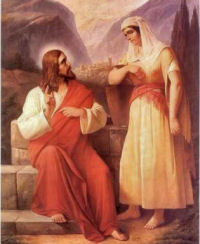
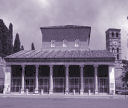
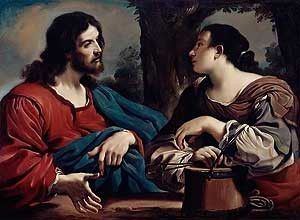
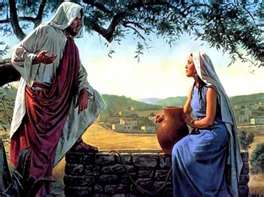
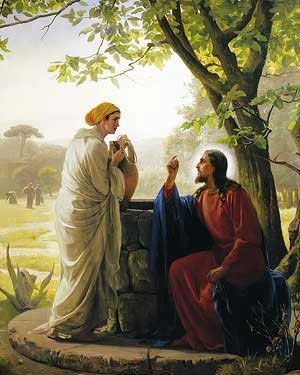
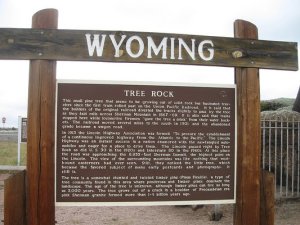
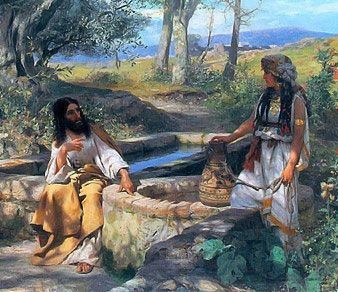


_-_James_Tissot_-_overall%5B1%5D.jpg)


